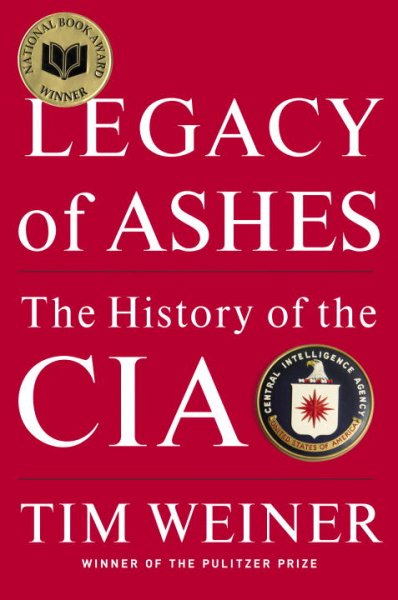 I love reading all things espionage (as you may have noticed if you have read my other reviews). Fiction or non-fiction, it does not matter. My fascination with it rests in the fact that it is kind of the dark side of what I do for a living: searching for information. Therefore, it is not much of a surprise that Legacy of Ashes has been on my “to read” list for awhile.
I love reading all things espionage (as you may have noticed if you have read my other reviews). Fiction or non-fiction, it does not matter. My fascination with it rests in the fact that it is kind of the dark side of what I do for a living: searching for information. Therefore, it is not much of a surprise that Legacy of Ashes has been on my “to read” list for awhile.
Legacy of Ashes is a history of the CIA based on a slew of recently declassified documents and copious interviews. Weiner acknowledges in the beginning that no history of an inherently secret organization can be considered definitive, but I would say his comes as close as one can. It is not a pretty picture, either.
The CIA was an outgrowth of a World War II organization called the Office of Strategic Services (OSS), which carried out commando style raids and other covert operations. As a result, the CIA had two focuses when it was created by Harry Truman in 1947. The first was to gather clandestine information on the nation’s enemies and the second was to carry out covert action against the nation’s enemies.
The second focus always outweighed the first. Much of the CIA’s history has been taken up with trying (and mostly failing) to carry out covert action around the world. The CIA, throughout the 1950s and 60s, dropped hundreds of commandos into Communist territory only to have them snapped up or killed by Communist security agencies. The problem, in a nutshell, was that although the CIA paid scant attention to gathering information, the Russians, Chinese and other nations spent a great deal of time gather information and thus often new the agents were coming.
Another side affect of the CIA’s lack of focus on intelligence gathering is its impressive record of misinterpreting major world events or simply not seeing them coming at all. Almost every major world event from the Chinese entry into the Korean War, to the Cuban Missile Crisis, to the collapse of the Soviet Union was completely missed by the CIA and thus came as a total shock to the US when they happened. Similarly the CIA’s tendency to filter everything through a cold war anti-communist lens meant that lacking hard intelligence the CIA simply made stuff up to fit their preconceived notions. Throughout the 1950s the CIA claimed that the Russians were out stripping the US in nuclear missile production. This was not the case and was based on CIA fears rather than anything they knew.
Weiner’s book is an eye-opener when it comes to understanding the history of the CIA. It can be so grim at times, the reader is often tempted to hope that there are some CIA successes that are still classified that would brighten Weirner’s assessment. That assessment is essentially that the CIA has largely failed in its work as an intelligence agency.
The narrative of the book is excellent. Weirner does a good job of breaking down complex historical events into manageable chunks. He is also great at incorporating quotes from the participants into the story.


